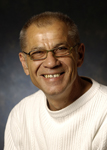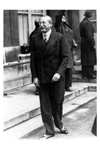November 12, 2009

Jean Bodon. Download image.
BIRMINGHAM, Ala. - University of Alabama at Birmingham (UAB) film Professor Jean Bodon, Ph.D., recently premiered his latest film, "Léon Blum: For All Mankind," at the Museum of Jewish Art and History in Paris.
The film, which examines the life the former three-time Prime Minister of France who was imprisoned in the infamous Buchenwald concentration camp during World War II, will be screened at the Film Society of Lincoln Center Walter Reade Theatre in New York City in January 2010. The schedule for the screening will be announced when it is finalized.
Bodon, a native of France who teaches film in the UAB Department of Communication Studies, says many people in his homeland are familiar with Blum, whose name is seen on many public buildings and schools around the country. But Bodon says none of his history teachers discussed Blum's incarceration in a concentration camp.
"Textbooks after World War II in France didn't mention it. France was ashamed of its past and was trying to brush away some events of WWII. I found out about it when I was gathering research for another documentary about my dad," says Bodon. "So, I contacted Blum's grandson and eventually co-wrote the script with him."
 |
| Leon Blum. Download image. |
Blum is best known by his countrymen for introducing labor reforms, including the 40-hour workweek, increased wages and two-week paid vacations for workers.
"He was like the Ghandhi of France," Bodon said. "He corresponded often with U.S. President Franklin D. Roosevelt during the war; they shared many similarities in that they were both concerned about workers' rights. They wanted to meet each other, but it never happened."
Blum's Jewish heritage and his socialist ideology eventually made him a target for the Nazis, and in 1943 they deported him to the Buchenwald concentration camp in Germany where he remained imprisoned for two years. Bodon says the Nazis used Blum as a hostage for a possible future exchange.
After his release, Blum headed France's provisional government from 1946-1947 and negotiated a U.S. loan to France for post-war reconstruction. He died in 1950.
Bodon says that while researching the film he dug through boxes of letters written by Blum, including letters to his brother, René Blum, who also was captured by the Nazis and later burned alive at Auschwitz. Bodon interviewed Blum's 96-year-old former assistant, his niece and several former French government officials. He also used archive footage from the Holocaust Museum and other archives. UAB French Professor Serge Bokobza, Ph.D., assisted Bodon with some of the research and interviewing.
"The film really shows that people in politics can be heroes and dedicated human beings," Bodon says. "People like Blum, Ghandhi and President Franklin Roosevelt were more human than politician, and we can thank them for what they have done."
About the Department of Communication Studies
The UAB Department of Communication Studies offers bachelor and graduate degrees in communication management and bachelor degrees in mass communication with specialization in journalism, broadcasting and public relations.